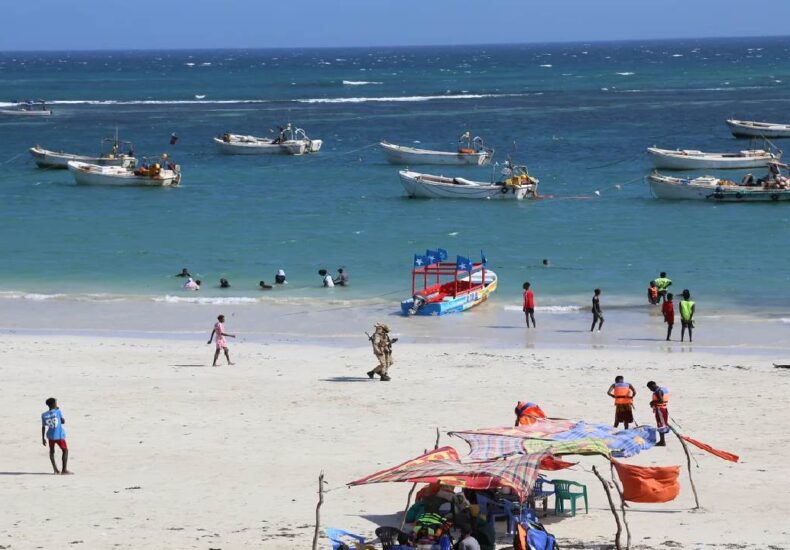
Why Travelers Are Heading to Somalia Despite the Risks
Fundacion Rapala – Somalia has lived for decades under the shadow of war, piracy, and instability. Its name often sparks fear, not curiosity. Yet the country is now observing a surprising rise in foreign tourists. Government data shows nearly 10,000 visitors arrived in 2024, a jump of 50 percent from the previous year. Many still land in Mogadishu with caution, feeling the tension the moment they step off the plane. Security checkpoints, armed escorts, and strict movement limits remain common. Still, people come. Some want to see a country that the world often misunderstands. Others enjoy traveling to remote places. The increase shows that danger alone does not stop everyone. Many travelers want to witness Somalia’s reality for themselves, not the version they see in headlines.
The Motivations Behind Visiting a High-Risk Destination
Travelers who choose Somalia often share the same desire: they want a challenge. Swiss traveler Karin Sinniger came as part of her quest to visit every UN country and dive in each one. When her equipment went missing, a local diver helped her with a simple air hose so she could complete her dive at Lido Beach. Tour operators confirm this interest. Untamed Borders, a company that specializes in extreme destinations, reports strong demand. Many of their clients visit because Somalia feels like one of the last “untouched” places. Even with warnings of kidnapping and terrorism, they continue to arrive. Travelers say the danger is real, but so is the appeal of seeing a place that is slowly rebuilding and showing signs of resilience.
“Read More : Ukraine’s Oil Hub Strike and Russia’s Deadly Attacks Leave Two Nations on Edge”
Security Risks Remain, Yet Violence Has Declined Over Time
Somalia is still one of the world’s most dangerous nations. Western governments warn of terrorism, crime, piracy, and limited consular support. Al Shabab continues to launch attacks, even in Mogadishu. Visitors stay inside secure compounds and move only with armed teams. Despite this, those who travel say the intensity of conflict has decreased compared to previous decades. Retired engineer Peter Bullock visited in 2024 and described the experience as unfamiliar but not frightening. He praised the efficiency of airport security and noted that the city felt calmer than he expected. Somalia remains fragile, but these small signs of improvement encourage travelers who want to experience a country in transition rather than decline.
Somaliland Offers a Safer Window Into the Region
While Somalia grabs headlines for danger, Somaliland provides a different story. This autonomous region has operated independently since 1991. It has its own government, army, and currency. Travelers can walk freely in Hargeisa, visit markets, and explore cultural sites without the heavy security seen in Mogadishu. Tour guide Deke Hassan Abdi works to show visitors that Somaliland is not the same as Somalia. Locals welcome tourists warmly because they want the world to know their region is peaceful. Outside Hargeisa, escorts are required, and the border with Somalia remains tense. Still, Somaliland offers a level of safety and openness that many travelers appreciate, along with attractions like ancient caves, desert landscapes, and quiet coastal towns.
Extreme Travelers See Somalia as a Rare and Valuable Experience
For a small but passionate group of travelers, Somalia represents an adventure they cannot find elsewhere. Many attend global “extreme travel” gatherings and seek destinations far from mainstream routes. Both Untamed Borders and Lupine Travel now offer scheduled trips, especially around major events like the Most Traveled People Summit. Travelers say they enjoy the raw, unfiltered experience Somalia provides. They appreciate small moments of connection, such as fishermen sharing stories or vendors offering tea. These encounters show a different side of Somalia one filled with pride, hope, and resilience. The country remains difficult, but for those who want to understand the human stories behind the headlines, these moments are worth the risk.
A New eVisa System Signals Hope for the Future of Tourism
In September 2025, Somalia launched a new eVisa system to simplify entry and encourage growth in tourism. Early users say the system works smoothly and is easier than many other countries. However, political challenges remain. Somaliland and Puntland refuse to accept the new visas, highlighting the limits of Somalia’s central authority. Still, the launch is a step forward. The system shows the government’s desire to open the country to visitors and improve its global image. Tour operators believe the eVisa could help build trust and bring more travelers in the long term. Somalia is still far from being a mainstream destination, but each visitor plays a small part in reshaping the country’s future.
Somalia’s Tourism Rise Reveals a Story of Courage and Curiosity
Somalia’s tourism growth does not mean the country is suddenly safe. Instead, it reveals something deeper about human nature. Travelers come because they want connection, truth, and understanding. Locals welcome them because they want the world to see more than conflict. The result is a fragile exchange built on respect and courage. Somalia may always remain a niche destination, but for now, it stands between danger and possibility a place where travelers seek meaning, and residents hope for recognition. In that meeting, a new chapter slowly begins.